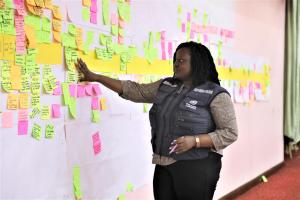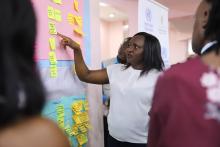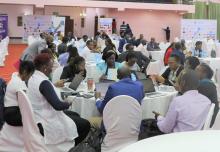Uganda reflects on response to recent Ebola outbreak
Uganda’s Ministry of Health, with support from World Health Organization (WHO) and partners, concluded a three-day After-Action Review (AAR) on 20 June 2025 to reflect on the country’s response to the recent Ebola outbreak.
The outbreak, declared on 30 January 2025, affected seven districts and three cities; Kampala, Mbale (district and city), Wakiso, Jinja (district and city), Ntoroko, Fort Portal, and Kyegegwa. In total, 14 cases were reported (12 confirmed and two probable). Ten people recovered from the infection, and 534 contacts were identified and closely monitored. The outbreak was declared over on 26 April 2025 by Health Minister Dr Jane Ruth Aceng Ocero, after a 42-day countdown following the discharge of the last confirmed case.
Uganda voluntarily conducted the Ebola outbreak AAR as recommended by International Health Regulations (IHR) Monitoring and Evaluation Framework. The IHR (2005) guide countries in managing public health emergencies that have the potential to cross borders.
“The AAR process is reflective in nature and helps in preparing better for future outbreaks with evidence by identifying what worked, what didn’t, and where research can guide a stronger, more informed response,” said Dr Charles Olaro, Director-General of Health Services.
The review brought together technical experts, health workers, district task forces, incident commanders, and community and political leaders from affected areas. It covered all key response pillars including coordination, surveillance, laboratory, case management, infection prevention and control, vaccination, risk communication, and community engagement.
“As the funding landscape evolves, we must be more strategic than ever. We must leverage what we already have: the dedication of our health workers, the infrastructure built during past responses, and the community networks that have consistently served as our first line of defense,” said Dr Kasonde Mwinga, WHO Representative in Uganda. “Every decision, every intervention, and every shilling must be directed where it will have the greatest impact.”
Uganda’s experience in managing outbreaks enabled a fast, coordinated and effective response. With support from WHO and partners, the Ministry of Health activated national coordination structures, deployed rapid response teams, strengthened surveillance, and established treatment units.
WHO deployed 129 staff, and 165 rapid response team members including trainees from African Volunteer Health Corps/ Strengthening and Utilizing Response Groups for Emergencies ( AVoHC SURGE) team to affected areas to manage alerts, trace contacts, and ensure no case went undetected. Screening was enforced at 13 points of entry, including Entebbe Airport. Seventy-eight WHO-supported Emergency Medical Teams ensured safe patient transport and care. WHO also deployed anthropologists, risk communication experts, and community engagement teams to address stigma, misinformation, and build public trust while reinforcing safety practices.
To support the national response, WHO mobilized $7.35 million from internal funding sources- WHO Contingency Fund for Emergencies and from partners and donors. This, along with in-kind contributions of essential medicines, supplies, and equipment, was vital in maintaining the momentum of operations.
WHO acknowledges the generous support from partners including Germany, Norway, Ireland, Canada, France, New Zealand, Kuwait, Portugal, Philippines, Republic of Korea, Switzerland, Estonia, and the WHO Foundation through the WHO Contingency Fund for Emergencies (CFE). Additional contributions came from the United Kingdom (Foreign, Commonwealth & Development Office), Republic of Ireland, Netherlands, European Commission - Health Emergency Preparedness and Response (HERA), International Development Research Centre, European Civil Protection and Humanitarian Aid Operations (DG ECHO) and African Public Health Emergency Fund.


